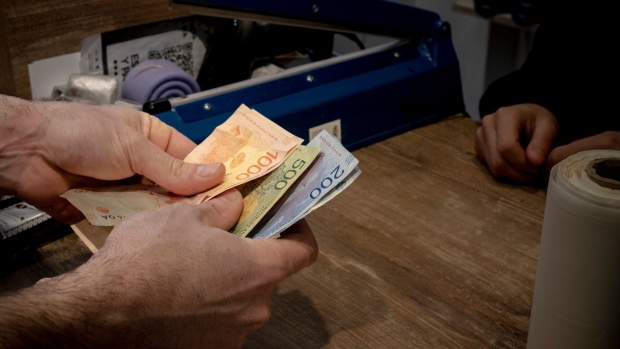Jan 11, 2024
Argentina’s Inflation Hits 211% in 2023, Fastest Gain in Three Decades
, Bloomberg News

(Bloomberg) -- Argentina ended 2023 with the fastest inflation in more than three decades as President Javier Milei started to unwind a thicket of currency controls and price freezes imposed by the previous administration.
Consumer prices soared 211.4% in December from a year earlier, putting Argentina ahead of Venezuela as the nation with the fastest inflation in Latin America. Official data published on Thursday also showed prices jumping 25.5% from November, below the 30% median estimate of economists surveyed by Bloomberg.
Since taking office Dec. 10, Milei devalued the peso 54% and eliminated price controls on hundreds of everyday consumer products, reversing the policies imposed by former Economy Minister Sergio Massa, who ran against him for president. The libertarian leader also halted runaway money-printing that had flared up during the presidential campaign.
Goods and services led monthly price increases in December, followed by health and transport.
Milei braced the country for the tough months ahead in his inauguration speech, reiterating “there is no money” and that Argentina risked slipping into hyperinflation if it didn’t change path. That hasn’t stopped worker unions from calling a general strike on Jan. 24, nor Argentines from banging pots and pans on the streets in protest of his austerity measures.
Read more: Argentina Wins Key IMF Support With Deal to Unlock $4.7 Billion
The International Monetary Fund gave Milei’s plan a vote of confidence, approving Wednesday a review of its $44 billion program that paves the way for a larger-than-expected loan disbursement of $4.7 billion. The Washington-based lender expects Argentina’s tough medicine to further boost prices in the coming months, before a gradual disinflation process starts as the country rebuilds credibility.
What Bloomberg Economics Says
“Argentine inflation was slower than expected in December, but that’s hardly a signal the worst is over. The January CPI print likely will be just as high, with the residual impact of the 54% currency devaluation in mid-December and hikes to regulated prices this month.”
— Adriana Dupita, Brazil and Argentina economist
Click here to read the full report.
Inflation remains far above the benchmark interest rate, which was cut to 100% when Milei’s government changed its main policy tool. Central bank chief Santiago Bausili assured on Wednesday that the IMF is comfortable with Argentina’s monetary policy — later described by the Fund’s spokeswoman Julie Kozack as evolving to support money demand and also disinflation.
Milei’s shock therapy will cause the economy to further contract this year, meaning Argentines will contend with a long period of stagflation.
(Adds Venezuela’s comparison in second paragraph and comment from Bloomberg Economics. A previous version of this story corrected the items that led December price increases.)
©2024 Bloomberg L.P.







